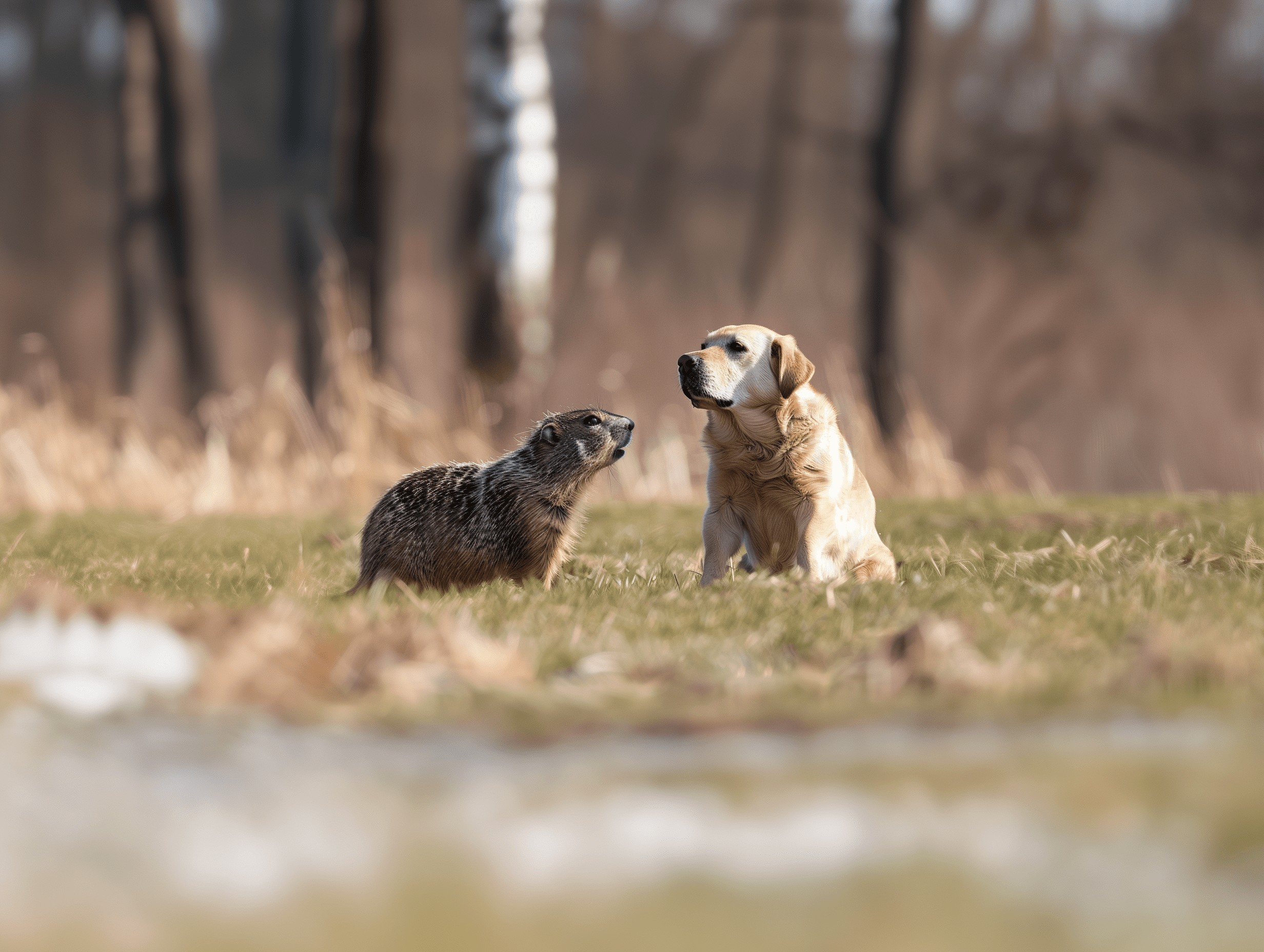
Understanding Groundhog Behavior and Habits
Docile Herbivores with One Exception
Groundhogs are generally docile herbivores, but they do have one exception when it comes to their behavior towards dogs. While they typically avoid confrontation and prefer to retreat to their burrows when threatened, groundhogs can become aggressive and may attack dogs if they feel threatened or cornered. This behavior is primarily driven by the groundhog's instinct to protect themselves and their territory.
Territorial Whistle Pigs Protecting Their Turf
Groundhogs, also known as whistle pigs, are territorial creatures that take their turf seriously. When it comes to protecting their territory, groundhogs can exhibit defensive behavior towards dogs. They may emit a high-pitched whistle-like sound as a warning to dogs, signaling their presence and their claim on the area. If the warning goes unnoticed or ignored, groundhogs may resort to physical aggression, including biting or scratching, in order to defend their territory.
Groundhogs Will Fight Back
Although groundhogs are generally non-confrontational, they have the capacity to fight back when faced with a threat. If a dog approaches a groundhog too closely or makes aggressive movements, the groundhog may respond with defensive actions. Groundhogs have sharp teeth and claws that they can use to defend themselves against potential predators, including dogs. While they typically prefer to avoid confrontations, groundhogs will not hesitate to fight back if they feel their safety is at risk.
Potential Risks and Hazards of Groundhog Encounters
Can a Groundhog Attack a Dog?
Groundhogs are generally not aggressive towards dogs and do not pose a significant threat. While it is possible for a groundhog to attack a dog if it feels threatened or cornered, these instances are rare. Groundhogs are typically more interested in finding food and shelter than engaging in confrontations with dogs.
Could a Groundhog Hurt My Dog?
Although groundhogs have strong front teeth that they use for digging burrows, they are not known to intentionally hurt dogs. Groundhogs are herbivores and primarily feed on vegetation, such as grasses, leaves, and plants. They do not have venom or aggressive tendencies towards dogs, making it unlikely for them to cause harm.
Do Groundhogs Bite?
Groundhogs are not typically prone to biting unless they are directly threatened or cornered. Their first instinct is to retreat to their burrows when faced with a potential threat, rather than resorting to biting. However, if a groundhog feels trapped or extremely threatened, it may bite in self-defense. It is important to remember that such situations are rare and most interactions between groundhogs and dogs are peaceful.
Preventive Measures to Keep Dogs Safe from Groundhogs
Signs of Groundhog Presence in Your Yard or Garden
One of the signs of groundhog presence in your yard or garden is the appearance of burrows. Groundhogs dig extensive tunnels and burrows, which can be identified by the large mounds of dirt around the entrance. These burrows serve as their homes and provide them with protection from predators. If you notice these burrows in your yard or garden, it is a clear indication that groundhogs are present in the area.
Separate Your Dog From The Carcass
When it comes to groundhogs and dogs, it is important to separate your dog from any groundhog carcass. Groundhogs may carry diseases such as rabies, which can be transmitted to your dog if they come into contact with an infected carcass. Additionally, groundhog carcasses can attract other wildlife, such as foxes or raccoons, that may pose a threat to your dog. Therefore, it is crucial to keep your dog away from any groundhog carcasses to ensure their safety and prevent the spread of diseases.
Prevention Is Better Than Cure
Prevention is better than cure when it comes to dealing with groundhogs and dogs. Taking proactive measures to prevent groundhog encounters can help protect your dog from potential dangers. Ensure that your yard or garden is properly fenced to prevent groundhogs from entering the area. Regularly inspect your property for signs of groundhog activity, such as burrows or damage to plants. If you spot any signs, consider contacting a professional wildlife control service to safely remove the groundhogs. By implementing preventive measures, you can minimize the risk of your dog encountering groundhogs and the potential hazards they may pose.
What to Do When Your Dog Killed a Groundhog
Assess Your Dog for Injury or Damage
After encountering a groundhog, it is crucial to assess your dog for any injuries or damage. While groundhogs are generally not aggressive towards dogs, they can defend themselves if they feel threatened. Check your dog's body for any scratches, bites, or wounds that may have been caused during the encounter. Pay close attention to their face, paws, and abdomen areas. If you notice any signs of injury, it is important to seek veterinary care as soon as possible to prevent any potential complications.
Check Your Dog’s Vaccination Status
One important step to take after your dog encounters a groundhog is to check their vaccination status. Groundhogs can carry diseases such as rabies, which can be transmitted to dogs through bites or scratches. Ensure that your dog's vaccinations, including their rabies shot, are up to date. If your dog is not vaccinated against rabies or other potential diseases, consult with your veterinarian to determine the appropriate course of action. Vaccinations play a vital role in protecting your dog's health and preventing the spread of diseases.
Take Your Dog To Their Vet
If your dog has had an encounter with a groundhog, it is recommended to take them to their veterinarian for a thorough examination. Even if there are no visible injuries, it is essential to have a professional assess your dog's overall health and well-being. The veterinarian can check for any underlying issues or potential health risks that may have resulted from the encounter. They can also provide appropriate treatment or preventive measures if necessary. Your veterinarian will be able to provide guidance and ensure your dog receives the necessary care to maintain their health and safety.